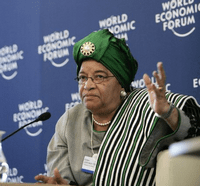MONROVIA, Liberia -- In her 2006 inauguration speech, with Liberia still reeling from civil wars that had lasted from 1989 to 2003 and killed more than 250,000 people, President Ellen Johnson-Sirleaf referred to a greeting children here use when their fathers return home from work -- or, as is common in Liberia, from trying to find it: "Papa na come." "Well, too many times, for too many families, Papa comes home with nothing," said Johnson-Sirleaf, Africa's first elected female head of state. "We will work to ensure that when our children say 'Papa na come,' Papa will come home joyfully with something, no matter how meager, to sustain his family."
As she seeks a second term in an election scheduled for Oct. 11, Johnson-Sirleaf's chances could hinge largely on whether voters believe she has kept that promise. Looking back on the past six years, few would dispute that there have been significant gains. With the lifting of embargoes on timber and diamond exports -- in 2006 and 2007, respectively -- Liberia is better positioned to profit from its natural resources. In June 2010, the country completed its commitments under the Heavily Indebted Poor Countries Initiative, a joint World Bank-International Monetary Fund program, qualifying it for $4.6 billion of debt relief. Foreign firms, drawn by the prospect of lucrative iron ore and oil deposits, have returned. Last month, ArcelorMittal, the world's largest steelmaker, announced the first iron ore shipment from Liberia in 20 years.
But it remains to be seen whether this is the type of progress that can ensure re-election. The most prominent opposition party, the Congress for Democratic Change (CDC), argues that ordinary Liberians have experienced few tangible benefits as a result of the government's successes. Having served stints at the U.N. Development Program and the World Bank before becoming president, Johnson-Sirleaf is certainly highly regarded in the international community -- as highlighted by her being named one of three co-winners of this year's Nobel Peace Prize. But in an interview during a campaign stop in Zwedru, in eastern Liberia, Winston Tubman, the CDC's presidential nominee, implied that Johnson-Sirleaf has spent her term impressing her foreign interlocutors at the expense of voters back home. "We don't want a government that will be respected in Washington but hated at home," Tubman said. "We want a government that will be respected at home and, because of that, will be respected in Washington and London and elsewhere in the world."

